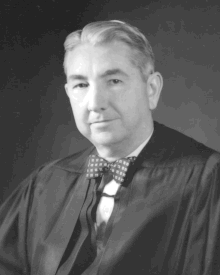Thomas Campbell Clark
| Tom C. Clark | |
|---|---|
 |
|
| Associate Justice of the Supreme Court of the United States | |
|
In office August 19, 1949 – June 12, 1967 |
|
| Nominated by | Harry S. Truman |
| Preceded by | Frank Murphy |
| Succeeded by | Thurgood Marshall |
| 59th United States Attorney General | |
|
In office June 27, 1945 – July 26, 1949 |
|
| President | Harry S. Truman |
| Preceded by | Francis Biddle |
| Succeeded by | Howard McGrath |
| United States Assistant Attorney General for the Criminal Division | |
|
In office 1943–1945 |
|
| President |
Franklin D. Roosevelt Harry S. Truman |
| Preceded by | Wendell Berge |
| Succeeded by | Theron Caudle |
| Personal details | |
| Born |
Thomas Campbell Clark September 23, 1899 Dallas, Texas, U.S. |
| Died | June 13, 1977 (aged 77) New York City, New York, U.S. |
| Political party | Democratic |
| Spouse(s) | Mary Ramsey |
| Children | 3, including Ramsey |
| Education | University of Texas, Austin (BA, LLB) |
| Military service | |
| Allegiance |
|
| Service/branch | United States National Guard |
| Unit | Texas National Guard |
Thomas Campbell Clark (September 23, 1899 – June 13, 1977), who preferred Tom C. Clark, was a Texas lawyer who served as the 59th United States Attorney General from 1945 to 1949. He was an Associate Justice of the Supreme Court of the United States from 1949 to 1967.
Born in Dallas, Texas, Clark graduated from the University of Texas School of Law after serving in World War I. He practiced law in Dallas until 1937, when he accepted a position in the United States Department of Justice. After Harry S. Truman became President of the United States in 1945, he chose Clark as his Attorney General. In 1949, Truman successfully nominated Clark to fill the Supreme Court vacancy caused by the death of Associate Justice Frank Murphy. Clark remained on the court until his retirement in 1967, and was succeeded by Thurgood Marshall. Clark retired so that his son, Ramsey Clark, could assume the position of Attorney General.
Clark served on the Vinson Court and the Warren Court. He voted with the Court's majority in the several cases concerning racial segregation, including the landmark case of Brown v. Board of Education. He wrote the majority opinion in Heart of Atlanta Motel v. United States, which upheld the public accommodations provision of the Civil Rights Act of 1964. He also wrote the majority opinion in Garner v. Board of Public Works, Joseph Burstyn, Inc. v. Wilson, and Abington School District v. Schempp.
...
Wikipedia
